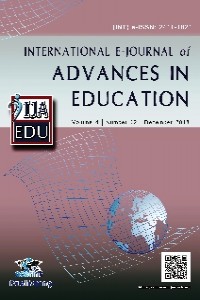Abstract
References
- Allington. R. (2001). What Really Matters for Struggling Readers: Designing Research-based Programs. New York: Addison-Wesley. Brooks, N. (1968). Teaching Culture in the Foreign Language Classroom. Foreign Language Annals, 1:3, 204-228. David,D.(2005).A study of Literature for Reading and Critics. Ithca, N.YCornell University Press. Harvey; D.(2002). Literature Circles: Voice and Choice in Book Clubs and Reading Groups. 2nd ed. Portland, ME: Stenhouse. Krashen, S. (2004). The power of Reading. Portsmouth: Heinemann and Westport, CN: Libraries Unlimited. Smith, J. (2012). Students' self-Perception of Reading Ability, Enjoyment of Reading and Reading Achievement. Learning and Individual Differences, 22(2), 202 -206. Collie,J , Slater,S.(1987).Literature In Language Classroom: A Source Book Of Ideas And Activities. Cambridge: CUP.
TODAY A READER TOMORROW A LEADER: FOSTERING THE STUDENTS’ NOTION OF READING FOR ENJOYMENT IN THE CONTEMPORARY LITERATURE CLASSROOM
Abstract
Teaching is
performance, which puts literature into an area of sharing, thinking, dreaming
and involving thoughts and passion. However, studying literature has become a
difficult task that so many students face today. Indeed, teaching literature to
language students constitutes an enormous challenge nowadays. In this case, the literature teacher is supposed to
discover the student's previous literary experiences, and to be thoroughly
familiar with the problems involved in the development of literary appreciation
in foreign language learning. Therefore, students need to be helped to
understand the importance of studying literature. For many students, literature
can help them to develop their language skills (reading, listening, speaking
and writing) ,for both; students and teachers, literature can be regarded an
important element that can develop and open their minds to different cultural
horizons. If the reader (student) is convinced that the study of literature offers
pleasure where the purpose of reading is enjoyment, the teaching of literature
will be rewarding for both teacher and students.
The present paper
outlines my short experience in teaching literature at the Department of
English at Hassiba Ben Bouali University of Chlef- ALGERIA- . It aims at
encouraging students to think creatively and independently to appreciate not
only the stimulation but also the enjoyment derived from the study of
literature. It is a venture that has enabled both the students and myself to
benefit from its virtues.
References
- Allington. R. (2001). What Really Matters for Struggling Readers: Designing Research-based Programs. New York: Addison-Wesley. Brooks, N. (1968). Teaching Culture in the Foreign Language Classroom. Foreign Language Annals, 1:3, 204-228. David,D.(2005).A study of Literature for Reading and Critics. Ithca, N.YCornell University Press. Harvey; D.(2002). Literature Circles: Voice and Choice in Book Clubs and Reading Groups. 2nd ed. Portland, ME: Stenhouse. Krashen, S. (2004). The power of Reading. Portsmouth: Heinemann and Westport, CN: Libraries Unlimited. Smith, J. (2012). Students' self-Perception of Reading Ability, Enjoyment of Reading and Reading Achievement. Learning and Individual Differences, 22(2), 202 -206. Collie,J , Slater,S.(1987).Literature In Language Classroom: A Source Book Of Ideas And Activities. Cambridge: CUP.
Details
| Primary Language | English |
|---|---|
| Journal Section | Articles |
| Authors | |
| Publication Date | December 28, 2018 |
| Submission Date | November 3, 2018 |
| Published in Issue | Year 2018Volume: 4 Issue: 12 |
Published and Sponsored by OCERINT International © 2015 - 2023
Contact: ijaedujournal@hotmail.com
International E-Journal of Advances in Education by IJAEDU is licensed under a Creative Commons Attribution-NonCommercial 4.0 International License. Permissions beyond the scope of this license may be available at http://ijaedu.ocerintjournals.org



